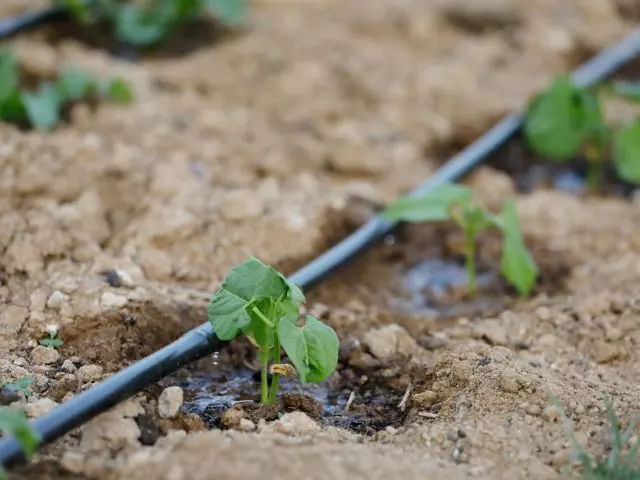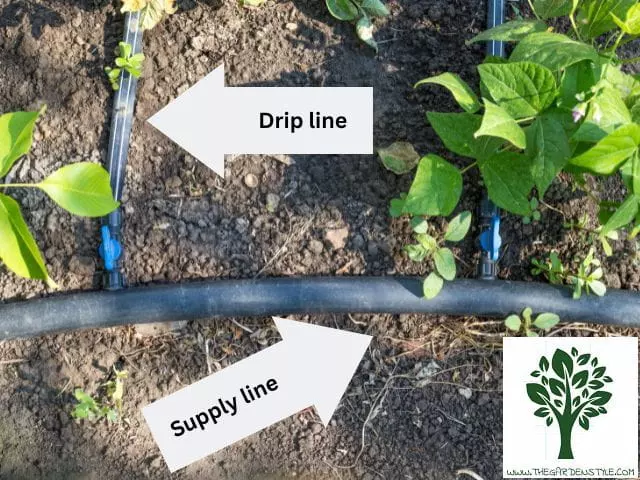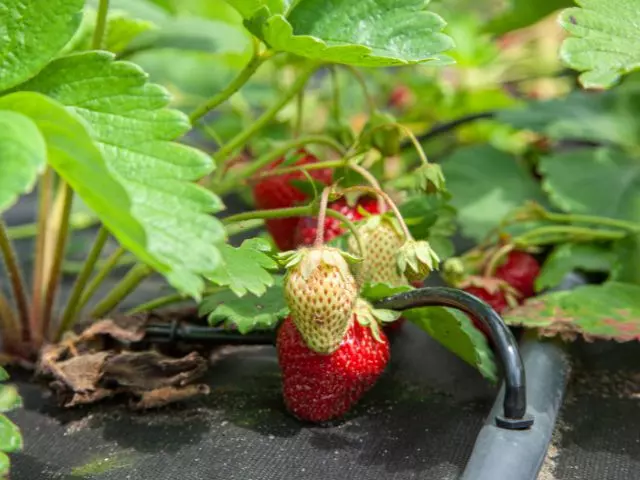Water is a vital resource for the planet. All biological processes depend on it, including human and plant life. It is a scarce resource, so it must be handled when watering plants. The drip irrigation system has become one of the most important for its efficiency, not only for reaching directly to the root but also for its efficient water use. Continue reading to learn about all the advantages of drip irrigation.
Table of Contents
What Is Drip Irrigation?
Drip irrigation is a focused system in which water is distributed directly into the soil, either above ground or buried near the roots. Either way, the water goes directly to the root system avoiding the leaves. With this system, water goes directly to the plant’s roots to be absorbed efficiently.
Roots are plant organ that not only provides fixation. It develops in the germination of the plant and is one of the most essential organs of the plant. Together with the stem, they are the axis of a plant.
According to the University of Rhode Island, drip irrigation stands apart from alternative irrigation methods, such as sprinklers, which exhibit an efficiency of only 65-75%. In contrast, drip irrigation achieves an impressive efficiency of 90%, enabling plants to utilize the applied water effectively. Keep reading to find out all the advantages of drip irrigation.

How Does Drip Irrigation Work
A drip irrigation system supplies water drop by drop to the roots to control the amount of water released. It is constant and uniform, so the plant always has the exact water it requires.
Irrigation technology services allow efficient management to control the drip irrigation system through any cell phone. Technology has become crucial for this type of system because it can measure the water, fertilizers, or fumigants delivered to the plant. You can also monitor its health, humidity, water quality, pH, oxygen, flow, and volume.
The drip irrigation system has different parts. Headers (water timers), drip lines, and their connectors, which connect them to the main line, are the components of the delivery and distribution system. They are the ones that carry the water to the plant and distribute it drop by drop. There are also filters to improve water quality, with sand and sediment separators. On the other hand, there are also pressure regulators to control the water flow.

- 2 SEPARATE PROGRAMMABLE ZONES - RAINPOINT sprinkler timer with 2 large outlets (Flow Rate 5-35 L/min), allows you to customize the watering schedule (start time, frequency, and run time) per zone, giving you complete control over the watering of each area of your yard and lawn, water your lawn evenly, efficiently, and effortlessly!
- 38 AUTOMATIC WATERING FREQUENCIES - This sprinkler timer outdoor offers a broad range of watering duration(1min -3h59min) and frequency(1h-12h and 1day-7day), which can customize flexible plans like hourly or daily cyclic watering and fixed time watering to ease your mind about watering while you’re away on vacation!
- 3 MANUAL WATERING MODES - Sprinkler timer with 3 separate manual modes, which can be switched between ZONE1, ZONE2, and BOTH ZONE by the "Zone" button, you can flexibly set the manual watering duration(1-59min) that you require. Straightforward and effective, allowing for quick and easy watering whenever and wherever necessary.
What Are the Advantages of Drip Irrigation
All drip irrigation systems have advantages and disadvantages, and knowing which is best for your crop or garden is essential. Here are the advantages of drip irrigation:
Reduced water usage: The drip irrigation system uses less water than sprinkler irrigation. Not only at the time of irrigation itself but also no water is lost as it runs off the leaves and is not absorbed by the plant. It is administered drop by drop in the soil, so the plant uses all the water used. Direct and controlled drip irrigation increases crop production and crop quality.
Low energy consumption: The pumping in the drip irrigation system is much lower, so the cost will be much lower than other systems.
Prevent soil erosion: With no water running off the land, there will be less soil erosion. Preventing soil erosion helps to maintain the soil as required for cultivation.
Decreased weeds: With drip irrigation, since water is delivered directly to the root, there is much less opportunity for weeds to grow, which can often be invasive and harmful to crop plants.
Efficient fertilizer application: Fertilizers, pesticides, and fumigants can be dissolved in the water to be applied during the drip. In this way, they are used little by little efficiently and without waste. This system also provides better control of specific pests that occur when the leaves are kept very wet.
Complete system automation: With technology, this type of irrigation system can be automated and controlled from a mobile application. In this sense, it is possible to monitor the water used, and the amount needed for each crop. This monitoring is essential for crop health and optimizing yields.

What Are the Disadvantages of Drip Irrigation
Drip irrigation, while highly efficient and beneficial in many ways, has some disadvantages. Here are the disadvantages of drip irrigation systems:
Initial cost: Setting up a drip irrigation system can be initially expensive, especially for large areas. The cost of purchasing and installing drip lines, emitters, filters, and other components can be higher than other irrigation methods.
Clogging: Drip emitters and lines are susceptible to clogging due to sediment, minerals, or organic matter in the water. Regular maintenance activities are necessary to prevent clogging and ensure optimal performance, such as flushing and cleaning the system.
Complex installation and maintenance: Installing and properly maintaining a drip irrigation system requires knowledge and expertise. Proper design, layout, and precise placement of emitters are essential for uniform water distribution. Regular inspections, repairs, and adjustments are necessary to keep the system functioning effectively.
Despite these disadvantages, drip irrigation remains a popular and effective watering method in many applications, especially in water-scarce regions or for specific crops where water efficiency is crucial.
Final Conclusions
With drip irrigation systems, watering your plants on vacation is a good option, so you can easily program the irrigation from your smartphone. Also, in places where water is scarce, drip irrigation is one of the best options to use.
Overall, drip irrigation offers an environmentally sustainable and viable solution for optimizing water use, improving crop productivity, and promoting efficient agricultural practices. Its benefits extend beyond water conservation, contributing to agrarian systems’ overall health and sustainability.

